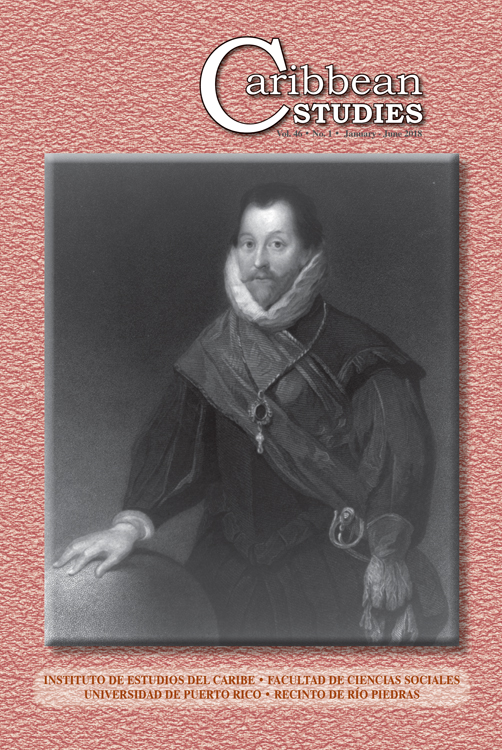Abstract
From official cultural policies to the tourism industry in the Caribbean, a racialized spirituality (seasoned with blackness) is celebrated, folklorized and cleaned-up to be used strategically to sell “authenticity” and local traditions (such is the case of Puerto Rico, Cuba and Dominican Republic). Yet, negative representations and discrimination against Afro-Caribbean religions continues. What place do we occupy in the Universe? Which kinds of cosmological maps could help us navigate and represent our contradictory human experience? How could we negotiate a healing space for our daily sufferings, challenges and desires? These transcendental spiritual questions become a huge material and philosophical problem in the violent colonial context of plantation slavery in the Caribbean, where the very humanity of enslaved ,people and their descendants was denied. But these questions become also a huge problem from the perspective of the masters. In these preliminary notes, I offer concerns and reflections about strategic uses of Afro-Caribbean spiritual practices. Particular attention is paid to how marginalized communities in the Caribbean and its diasporas use these small acts of resistance as workshops of vernacular knowledge, memory archives and healing spaces.
References
Alexander, M. J. 2005. Pedagogies of Crossing: Meditations on Feminism, Sexual Politics, Memory, and the Sacred. Durham: Duke University Press.
Bal, M., Jonathan Crewe y Leo Spitzer. 1999. Acts of Memory: Cultural Recall in the Present. Darmouth: University Press of New England.
Bell, B. 2013. Fault Lines: Views across Haiti’s Devide. New York: Cornell University Press.
———. 2006. Walking on Fire: Haitian Women’s Stories of Survival and Resistance. New York: Cornell University Press.
Bickerton, D. 1983. “Creole Languages.”Scientific American 249(1):116-122.
Brown, K. M. 2001. Mama Lola: A Vodou Priestess in Brooklyn. Vol. 4. Oakland: University of California Press.
Cabrera, L. 1954. El Monte. Habana: Ediciones Universal.
Crenshaw, K. 1991. “Mapping the Margins: Intersectionality, Identity, Politics, and Violence against Women of Color.” Stanford Law Review 1241-1299.
Desmangles, L.G. 2000. The Faces of the Gods: Vodou and Roman Catholicism in Haiti. Chapel Hill: University of North Carolina Press.
Duany, J. 1994. Quisqueya on the Hudson: The Transnational Identity of Dominicans in Washington Heights. New York: CUNY Dominican Studies Institute.
Godreau, Isar. 2009. Scripts of Blackness and the Racial Dynamics of Nationalism
in Puerto Rico. Cuadernos del Instituto de Investigaciones Interdisciplinarias Núm. 6. Cayey: Universidad de Puerto Rico en Cayey.
Kelley, R. 1996. Race Rebels: Culture, Politics, and the Black Working Class. New York: Simon and Schuster.
Khan, A. 2004. Callaloo Nation: Metaphors of Race and Religious Identity Among South Asians in Trinidad. Durham: Duke University Press.
Laguerre, Michael S. 1987. “The Evolution of Slave Medicine”. Pp. 15-33 en Afro-Caribbean Folk Medicine. Massachusetts: Bergin & Garvey Publishers, Inc.
———.1987. “Faith Healing”. Pp. 73-85 en Afro-Caribbean Folk Medicine. Massachusetts: Bergin & Garvey Publishers, Inc.
———.1979. Etudes sur le Vodou Haitien. Travaux du Centre de Recherches Caraibes. Montréal: Presses de L’ Université de Montréal.
Lorde, A. 1984. Sister Outsider: Essays and Speeches. Berkeley: Crossing Press.
Mohanty, C.T. y Biddy Martin. 2003. “Feminist Politics: What’s Home Got to Do With It?” Pp. 86-105 en Feminism without Borders: Decolonizing Theory, Practicing Solidarity, editado por Chandra T. Mohanty. Durham: Duke University Press.
Mintz, S. W. 1996. Tasting Food, Tasting Freedom: Excursions into Eating, Culture, and the Past. Boston, MA: Beacon Press.
———. 2010. “Creolization, Culture and Social Institutions.” Pp. 182-205 en Three Ancient Colonies: Caribbean Themes and Variations Vol. 8. Cambridge, MA: Harvard University Press.
——— y R. Price. 1986. The Birth of African-American Culture: An Anthropological Perspective No. 2. Boston, MA: Beacon Press.
Marte, L. 2007. “Foodmaps: Tracing Boundaries of ‘Home’ through Food Rela- Foodmaps: Tracing Boundaries of ‘Home’ through Food Relations.” Food and Foodways 15(3-4):261-289.
——— 2012. “Dominican Migrant Cooking: Food Struggles, Gendered Labor, and Memory-work in New York City.” Food and Foodways 20(3-4):279-306.
Morgan, J.L. 2004. “Hannah and Her Children”: Reproduction and Creolization among Enslaved Women.” Pp. 107-143 en Laboring Women: Reproduction and Gender in New World Slavery. Philadelphia: University of Pennsylvania
Press.
Palmié, S. 2013. The Cooking of History: How not to Study Afro-Cuban Religion. Chicago: University of Chicago Press.
———. 2009. “Intangible Cultural Property, Semiotic Ideology, and the Vagaries of Ethnoculinary Recognition.”African Arts 42(4):54-61.
———. 2006. “Creolization and Its Discontents.” Annual Review of Anthropology 35:433-456.
———. 1995. “Against Syncretism: Africanizing and Cubanizing Discourses in North American Orisa Worship.” En Counterworks: Managing the Diversity of Knowledge, editado por R. Fardon. London/New York: Routledge.
Pérez, E. 2016. Religion in the Kitchen: Cooking, Talking, and the Making of Black Atlantic Traditions. New York: New York University Press.
Quintero Rivera, A. 1998. Vírgenes, magos y escapularios: Imaginería, etnicidad y religiosidad popular en Puerto Rico. Fundación Puertorriqueña de las Humanidades.
Ramsey, K. 2011. The Spirits and the Law: Vodou and Power in Haiti. Chicago: University of Chicago Press.
Román, Reinaldo. 2013. “Religiones afrocaribeñas en Puerto Rico”. Enciclopedia de Puerto Rico. Accedido agosto 2017 (https://enciclopediapr.org/encyclopedia/religiones-afrocaribenas-en-puerto-rico/).
Sandoval, Mercedes C. 1979. “Santería as a Mental Health Care System: An Historical Overview.” Social Science and Medicine 130(2):137-151.
Scott, J.C. 2008. Weapons of the Weak: Everyday Forms of Peasant Resistance. New Heaven: Yale University Press.
Spitzer, Leo. 1999. “Back through the Future: Nostalgic Memory and Critical Memory in a Refuge from Nazism.” Pp. 87-104 en Acts of Memory: Cultural Recall in the Present, editado por Mieke Bal, Jonathan Crewe y Leo Spitzer.
Tejeda Ortiz, J. 1980. Medicina folklórica. Santo Domingo: Horizontes de América, Colección SESPAS.
Ulysse, G.A. 2006. “Papa, Patriarchy, and Power: Snapshots of a Good Haitian Girl, Feminism, & Dyasporic Dreams.” Pp. 24-47 en Journal of Haitian Studies.
Yelvington, K.A. 2001. “The Anthropology of Afro-Latin America and the Carib- The Anthropology of Afro-Latin America and the Caribbean: Diasporic Dimensions.” Annual Review of Anthropology 30(1):227-260.
Weniger, B., Hagg-Berrurier y R. Sutton. 1982. “Plants of Haiti Used as Antifertility Agents.” Pp. 67-84 en Journal of Ethnopharmacology 6.

